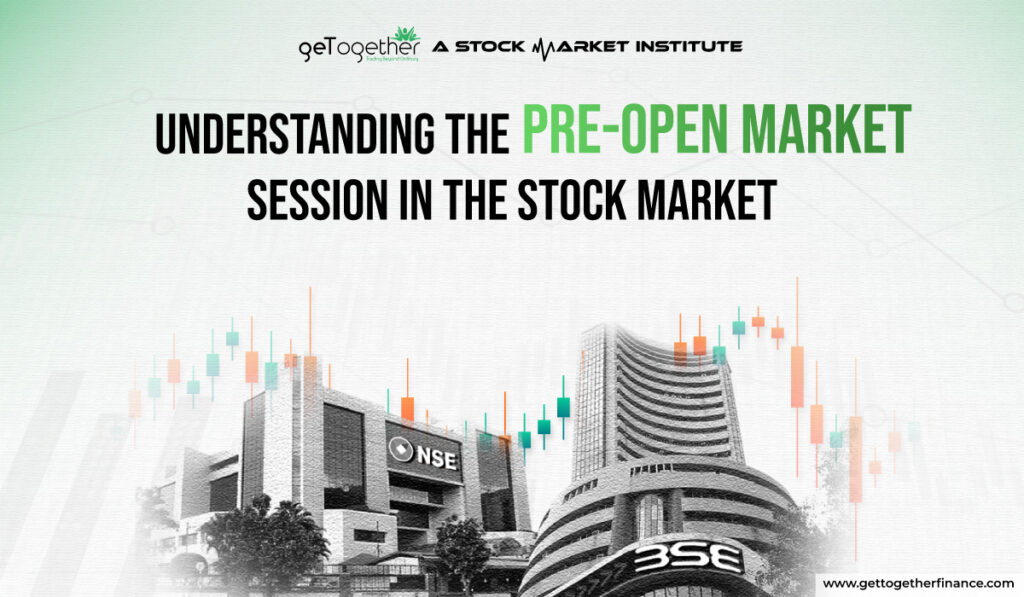Understanding the Pre-Open Market Session in the Stock Market
- May 4, 2024
- 3532 Views
- by Manaswi Agarwal


Pre-Open market Session or pre-market sessions in the Indian stock market starts from 9:00 a.m. to 9:15 a.m. The pre-opening market sessions start 15 minutes before the actual trading session starts in NSE or BSE. The regular trading session in NSE or BSE starts from 9:15 a.m. and lasts till 3:30 p.m. The motive of this session is to reduce the price volatility at the time of market opening. Pre-opening market is a strategy which is adopted to deal with heavy market volatility which might happen due to some events or announcements before the market opens for actual trading.
Segments of pre-market opening session

To carry the process smoothly and manage the trading sessions, it needs to be divided in different stages. The pre-opening session of the market has been subdivided into three phases for investors to execute or place their orders. The segments are divided as order entry session, order matching session and buffer session. Each section has its working where a certain activity takes place so that regular trading sessions can start timely.
Order Entry Session
Pre-market opening session opens for the first 8 minutes i.e. from 9:00 a.m. to 9:08 a.m. During this time, investors can place limit orders or market orders as in this session, the stock exchange can collect, modify or cancel the orders. The orders are only placed during this session and are not executed; no orders can be placed after the order entry session.
Order Matching Session
The order matching session starts after the order entry session and lasts for 4 minutes i.e. from 9:08 a.m. to 9:12 a.m. During this session the process of order confirmation and order matching takes place. Also, in this session the opening price of the stocks are calculated. No investor can buy, sell, modify or cancel their orders during this session.
Buffer Session
This is the last phase of the pre-market opening session which lasts for 3 minutes i.e. from 9:12 a.m. to 9:15 a.m. where the transition of pre market to regular trading session takes place. The buffer session is mainly conducted to address the abnormalities and ensure a smooth transition.
What are the benefits of pre-open market sessions?

There are several benefits of pre-open market sessions to the investors as they can react to the overnight changes and developments. This allows investors to establish their position before the market opens and enjoy profits.
Manage Market Volatility
The pre-market open session gives a chance to the investors or traders to place their orders before the actual start of the trading session which helps to minimize the market volatility during the trading session.
Enhanced Liquidity
During the pre-market hours, as investors are allowed to place the orders before regular trading sessions results in increased liquidity in the market. Investors can efficiently enter or exit their trade positions during trading hours.
Increased Market Accessibility
As a result of increased trading hours, it becomes accessible for investors belonging to different time zones to participate in the market activities. This results in increased global participation as well as market accessibility for various investors.
Favorable Stock Pricing
Pre-market orders are beneficial for investors or traders who keep regular updates of the market and are familiar with trading patterns. They can identify the changes in stock prices and accordingly utilizes pre-market trading hours to place the orders at favorable prices.
What are the risks of pre-open market sessions?

Apart from the benefits, risks are also associated with pre-open market sessions for traders and investors. It is required to deeply analyze the market and make decisions through proper strategies. To place orders in a pre-market session, you must have a broker who can help you execute the order. Moreover, a proper knowledge about the working of pre-open market sessions is required to avoid any kind of difficulties.
Limited Time
The duration of the pre-market session is fixed for 15 minutes which is a limitation for investors. Traders or investors might need more time to react to the strategies according to the news or events and make changes in their decisions. There is a limited time to react to make an effective decision as to react towards market volatility.
Lack of Market Depth
During the pre-market trading hours, traders are not aware about the market depth as the number of buyers and sellers is uncertain. This is a limitation for the investors as it is difficult to determine the market sentiments and predict price movements.
Lack of Flexibility
During pre-market trading sessions, traders do not have the flexibility to execute their trades as per their planned strategies. They cannot execute their trades like in regular trading hours which reduces the overall flexibility.
Rules and Regulations
Pre-open market sessions are restricted to various kinds of rules and regulations which should be deeply understood by the investors who trade during these sessions. These rules and regulations might have an impact on their trading strategies which is why investors must be aware about this.
How does pre-market order work?

When investors place orders in the beginning of the actual trading session, the orders must be well planned by following rule based strategies. Investors can buy or sell the stock at a particular price as their strategy, if the price reaches to the specified price then the orders gets executed. Once an investor places the order through a broker, the order either gets executed or rejected in normal trading hours as per their price.
Order Placements
Investors are allowed to place their orders of buying and selling in pre-market hours. Investors can do so through brokerage platforms before the beginning of the market session. Investors place the orders by specifying the quantity of shares at a particular price to buy or sell.
Order Types
Investors can place two types of pre-market orders which are limit orders and market orders. Limit orders are placed at a specific price, if the price of the stock reaches at the particular specified price order placed by the investor then the order will be executed, otherwise it won’t execute. In market order, the order of buy or sell gets placed at the best available prices. So, to place a pre-market order it is required to contact your broker to help you execute the order effectively. Investors can also place Valid Till Date (VTD) orders, according to which they can set the expiry date of their order. This can only be done for cash delivery orders.
Also Read: GTT Order
Order Matching and Execution
After the orders are placed by the investors, the orders are then collected and matched to the price and the time. The limit orders are placed and executed in this phase by matching the prices of buying or selling.
Wrapping it up
To trade during pre-market sessions, investors must confirm the time as per the stock exchange that they have opted to trade in. The timings of pre-market sessions may vary for different stock exchanges. In this session, investors can place their orders to beat the market volatility and efficiently execute their trades as per their strategies.
FAQs
Q1. What is a pre-open market session in the stock market?
Pre-open market session refers to the time where market opens before actual trading hours i.e. from 9:00 a.m. to 9:15 a.m. for investors to place the orders.
Q2. What securities can be traded in the pre-market hours?
In pre-open market sessions, investors can trade only cash in equity stocks. Options cannot be traded during this session.
Q3. Can I cancel my orders during the pre-open market session?
Yes, you can place cancel orders during pre-open market sessions but this should be done before actual hours of trading starts.
Q4. How to place orders during pre-market trading hours?
You need to have a Demat account where you can place your limit order by specifying the number of shares you want to trade at a particular price.
Q5. What is the opening time of the stock market?
The stock market opens at 9:15 a.m. for regular trading before there is a pre-market session which is conducted to place orders of buying or selling.



 Instagram
Instagram 
